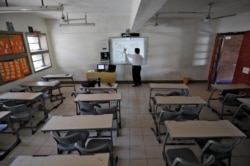School closures due to the COVID-19 crisis have disrupted the education or employment of 70 percent of young people between 18 and 29 years old, and has led to severe job losses and increased impoverishment, the International Labor Organization reports.
A survey of 12,000 young people in 112 countries in April and May describes the devastating and disproportionate impact the pandemic is having on their education, training and job prospects.
The ILO finds youth in low-income countries, who cannot easily access online learning, are particularly hard hit. While 65 percent of young people in the richer countries were taught via video-lecture, the ILO survey finds only 18 percent in the poorer countries could study online.
The director of the ILO employment policy department, Sangheon Lee, says similar disparities exist in the realm of unemployment, where one in six youth in poor countries has had to stop work since the onset of the pandemic.
"This is not just about the job losses," Lee said. "Even for those who actually remain employed after the onset of the pandemic, the working hours fell by nearly a quarter and two out of five young people reported a reduction in their incomes."
The report finds the impact of COVID-19 lockdowns, job losses and fears for their future are affecting the mental well-being of young people, with 50 percent reporting an increase in anxiety or depression. COVID-19 is the disease caused by the coronavirus.
A large proportion of people in Africa work in the informal sector. During past periods of crises, Africans, who may have lost their jobs in the organized labor market, could usually count on the informal sector as a last resort to make ends meet, Lee says.
"But now this option is not readily available at the moment because all the employer — informal, commercial or sales or whatever — activities are heavily affected by the lockdown or related restrictive measures so they cannot use the informal sector as a basis for their survival strategy," Lee told VOA.
The report warns that young people of this so-called lockdown generation are likely to suffer prolonged problems from the impact of the pandemic. The ILO is calling for urgent, large-scale and targeted policy responses to protect a whole generation of young people whose employment prospects risk being permanently scarred by the crisis.





